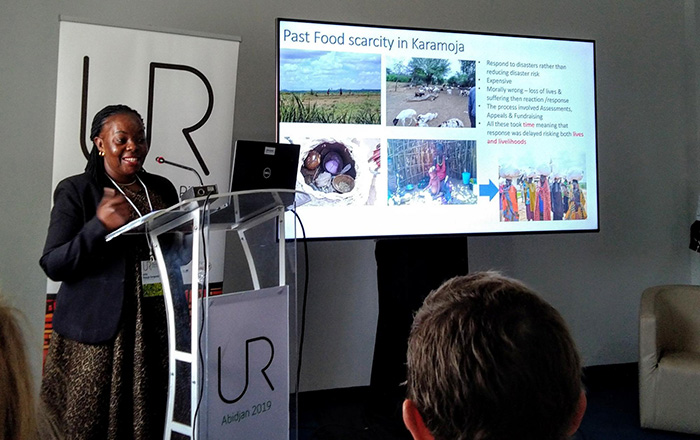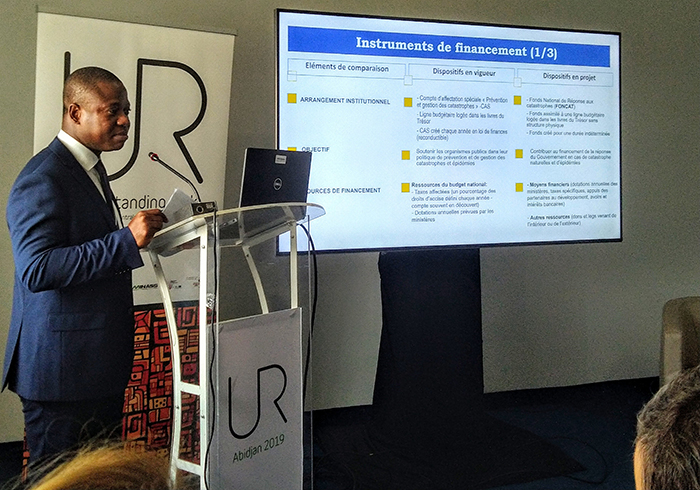
Photo Caption: Presentation by Mrs. Stella Naguija during the ADRF Initiative knowledge sharing event
Source: GFDRR
Recent years have shown the growing demand for support and tremendous drive by Sub-Saharan African countries to work on the Disaster Risk Financing (DRF) agenda. This was confirmed during a knowledge sharing event organized in Abidjan, Côte d’Ivoire on 20 November 2019 in the margins of the Understanding Risk (UR) West and Central Africa conference which focused on projects and activities implemented in the frame of the European Union (EU) funded Africa Disaster Risk Financing (ADRF) Initiative.
Eager to learn and share knowledge from their respective countries and regions, over 30 participants from 15 countries (Benin, Burkina Faso, Cabo Verde, Cameroon, Democratic Republic of Congo, Morocco, Mozambique, Niger, Republic of Congo, Sierra Leone, São Tomé and Príncipe, Rwanda, Tunisia, Uganda and Zambia) gathered for a session to share experiences, knowledge and lessons learned on DRF activities related in their respective countries. This event was structured around a set of presentations focusing on different DRF topics, similarly to an ADRF knowledge sharing event that took place in Mexico in May 2018.
After an introduction about the ADRF Initiative and its objectives and achievements to date, given by Mrs. Naomi Cooney, Senior Financial Officer at the World Bank, the first session focused on the importance of gathering and developing disaster risk information, which is a crucial step to help Governments’ decisions when developing DRF policies and instruments. In this light, Mrs. Gisèle Yela from the Republic of Congo and Mrs. Nuala Cowan of the Global Facility for Disaster Reduction and Recovery (GFDRR) presented DRF-related activities under the Open Cities Africa program and specifically highlighted the importance of a participatory approach in communicating risk information and the need to create effective response and contingency capacities.
This was followed by a presentation from the Government of Uganda, delivered by Mrs. Stella Nagujja, DRF Coordinator of the Northern Uganda Social Action Fund. She highlighted the importance of shock-responsive safety nets that can effectively reach the most vulnerable people following disasters. In this specific case, the presentation focused on an innovative shock-responsive safety net program which utilized the latest satellite technology to predict drought and to scale up a safety net in the drought prone Karamoja region of Uganda, which helped to frame the ensuing discussions on this topic.

Photo Caption: Presentation by Mr Rodrigue Chaou from the Government of Benin about the importance of being financially prepared to climate shocks
Source: GFDRR
The following session focused on the development of DRF strategies, which is one of the key objectives of the ADRF Initiative. A presentation by Mr. Felix Lung, DRF Consultant at the World Bank, used the Kenyan National DRF strategy as an example of how Ministries of Finance can take ownership to develop their own tools to finance disaster response. This was also put in a broader perspective using data from other African countries, demonstrating the significant financial and human impact of shocks in the region. Mr. Rodrigue Chaou representing the Government of Benin then talked about contingency funding as an effective tool for allowing countries, such as his own, to financially prepare and rapidly respond in the case of climate shocks. These examples show the drive, ambition and dedication of African Governments to find innovative and sustainable solutions to tackle the impact of natural disasters, an ever increasing risk to their macro fiscal situation, economies and people, including by developing specific instruments for risk management and financing of disaster shocks.
Following Mr. Chaou’s presentation, Ms. Albertina Costa from Cabo Verde reported that the national government and the World Bank have been collaborating on strengthening DRM in order to protect public safety and development gains across sectors in the country. This cooperation has led to the signing of a Disaster Risk Management Development Policy Financing with a Catastrophe Deferred Drawdown Option (Cat-DDO) in June 2019, and is contributing to strengthening the government’s policies and instruments for DRM and DRF. The program is also fully aligned to the National Disaster Risk Reduction Strategy which was approved in October 2018.
At the end of the event, Mr. Stephan Zimmermann, Disaster Risk Management Specialist at GFDRR, introduced the audience to the EU/World Bank/GFDRR Global Partnership on DRF Analytics and one of its main outputs: a set of generic analytics tools that help governments make better informed decisions about DRF instruments.
This knowledge sharing event was a reminder of the continued support by the ADRF Initiative to implement important DRF activities in Sub-Saharan African countries in order to find innovative solutions to meet their DRF needs in a variety of sectors and contexts. Each presentation enabled the audience to share their own ideas and perspectives and sparked interesting discussions. Most importantly, this ADRF knowledge sharing event has successfully enabled participants to reflect, take stock and take away important messages and good practices to share and disseminate at home.
